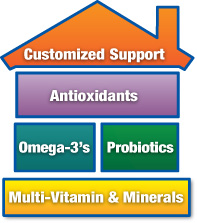
Ever since our article calling out Dr. Oz for flip-flopping on krill oil dosing, we’ve seen the same comment over and over (especially on facebook): How many supplements are we expected to take? How do you know when enough is enough? And do you even need supplements if you eat a healthy diet?
Lets take those questions one at a time.
Do You Really Need Supplements If You Eat Healthy?
Some facebook posters mentioned that their doctors think supplements are not needed if you eat a good healthy diet with lots of veggies. Is this true?
Well it depends, on a couple things. First of all, what’s your goal? Do you want to get enough nutrients to get by and not be deficient, or do you want to get what you need to really experience the fullness of optimal health?
We assume that since you’re here reading this you’re not interested in just meeting the lowest acceptable standard. But the truth is, even if you were, it’s going to take more than what you can find at your typical supermarket.
In 2009, a pretty exhaustive study found that the produce you buy in America is as much as 40% lower in important nutrients than it was just 50 years ago. The study authors gave 2 reasons:
1- The “dilution effect.” The higher yeild of any crop, the lower the nutrients in each individual fruit or vegetable. This is because more hungry plants are getting nutrients from the same soil.
2 – Bigger isn’t better. Today’s crops are often grown for bigger size – to look better in the store and fetch higher prices – than nutritional value. A large squash has less nutritional benefit than a small one.
3 – Genetic dilution. From the Time Magazine article on the same study:
Less studied, though, is the “genetic dillution effect,” in which selective breeding to increase crop yield has led to declines in protein, amino acids, and as many as six minerals in one study of commercial broccoli grown in 1996 and ’97 in South Carolina. Because nearly 90% of dry matter is carbohydrates, “when breeders select for high yield, they are, in effect, selecting mostly for high carbohydrate with no assurance that dozens of other nutrients and thousands of phytochemicals will all increase in proportion to yield.”
Is organic better? Not necessarily. While studies have found some nutrients are higher in organic produce, they still don’t necessarily give you everything you need for optimal health. (Calcium, for example, is not well absorbed through diet – but just don’t tell that to the dairy council.)
How To Determine If a Supplement Is Right For You
A Sensible Supplement Plan For Optimal Health
 Because everyone has different needs, we came up with something called the “Blueprint For Health.” It’s a sensible framework that helps you decide which supplements you need, and which you might can skip.
Because everyone has different needs, we came up with something called the “Blueprint For Health.” It’s a sensible framework that helps you decide which supplements you need, and which you might can skip.


Geek1;
Thanks for cutting through the madness